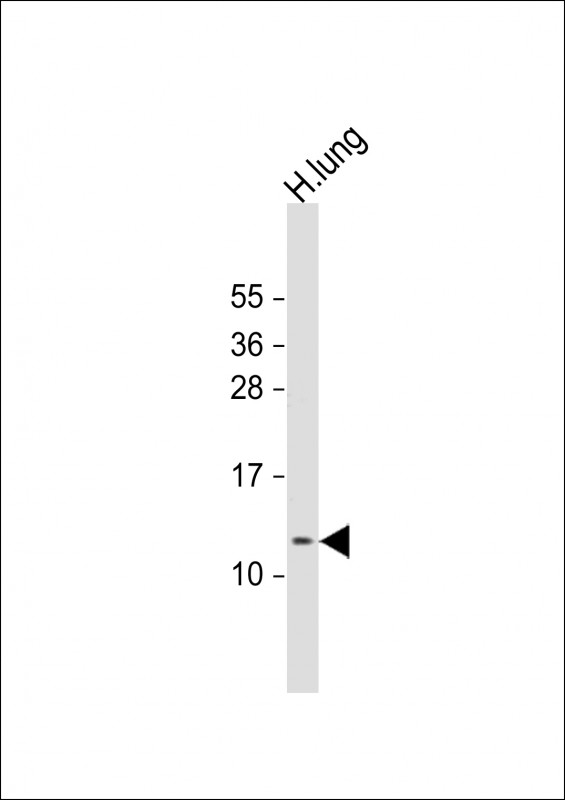
| WB | 1/1000 | Human,Mouse,Rat |
| IF | 咨询技术 | Human,Mouse,Rat |
| IHC | 咨询技术 | Human,Mouse,Rat |
| ICC | 技术咨询 | Human,Mouse,Rat |
| FCM | 咨询技术 | Human,Mouse,Rat |
| Elisa | 咨询技术 | Human,Mouse,Rat |
| Aliases | Putative protein RIG, Protein regulated in glioma, RIG |
| WB Predicted band size | 12.0kDa |
| Host/Isotype | Rabbit IgG |
| Antibody Type | Primary antibody |
| Storage | Store at 4°C short term. Aliquot and store at -20°C long term. Avoid freeze/thaw cycles. |
| Species Reactivity | Human |
| Immunogen | This RIG antibody is generated from a rabbit immunized with a KLH conjugated synthetic peptide between 58-87 amino acids from of human RIG. |
+ +
以下是关于RIG抗体的3篇参考文献及其摘要概括:
---
1. **文献名称**:*Structural Basis for dsRNA Recognition by RIG-I and Immune Activation*
**作者**:Jiang, X., et al.
**摘要**:本研究通过X射线晶体学解析了RIG-I蛋白识别病毒双链RNA(dsRNA)的分子机制,并利用特异性抗体验证了RIG-I的构象变化。研究揭示了RIG-I激活先天免疫信号的关键结构域,为抗病毒药物设计提供了理论依据。
---
2. **文献名称**:*Antibody-Mediated Detection of RIG-I in Autoimmune Disorders*
**作者**:Tanaka, Y., et al.
**摘要**:通过开发高特异性抗RIG-I单克隆抗体,研究者发现系统性红斑狼疮(SLE)患者外周血细胞中RIG-I表达显著上调。抗体介导的检测技术为自身免疫疾病的诊断和治疗靶点筛选提供了新工具。
---
3. **文献名称**:*RIG-I Antagonism via Monoclonal Antibody Attenuates Antiviral Response*
**作者**:Wang, Q., et al.
**摘要**:研究团队设计了一种阻断型抗体,通过抑制RIG-I与病毒RNA的结合,显著降低细胞中干扰素β(IFN-β)的分泌。该抗体为过度免疫反应(如细胞因子风暴)的治疗提供了潜在策略。
---
如需更多文献或特定研究方向,可进一步补充说明。
RIG antibodies target retinoic acid-inducible gene I (RIG-I), a cytosolic pattern recognition receptor critical in antiviral innate immunity. Discovered in 2004. RIG-I is a key sensor of viral RNA, particularly short double-stranded RNA (dsRNA) or uncapped 5'-triphosphate single-stranded RNA from RNA viruses like influenza, hepatitis C, and SARS-CoV-2. Upon detecting viral RNA, RIG-I undergoes conformational changes, interacts with mitochondrial antiviral-signaling protein (MAVS), and triggers signaling cascades that activate transcription factors (IRF3/7. NF-κB) to induce type I interferons (IFNs) and proinflammatory cytokines. This response establishes an antiviral state in infected and neighboring cells.
Research on RIG-I antibodies focuses on two aspects: 1) As tools to study RIG-I's structure-function relationships, subcellular localization, and post-translational modifications (e.g., ubiquitination) regulating its activity. 2) As therapeutic candidates to modulate immune responses—either agonistic antibodies to boost antiviral defenses in immunosuppressed conditions or antagonistic antibodies to mitigate excessive inflammation in autoimmune disorders. Dysregulated RIG-I signaling is implicated in chronic viral infections, autoimmune diseases (e.g., lupus), and cancer. Recent studies also explore RIG-I's role in detecting endogenous RNA damage, linking it to sterile inflammation. Antibodies against RIG-I are pivotal in elucidating these pathways and developing immunotherapies.
×